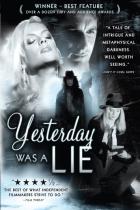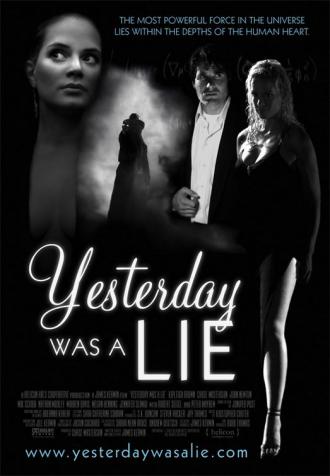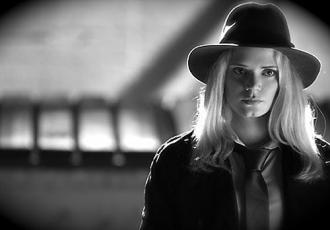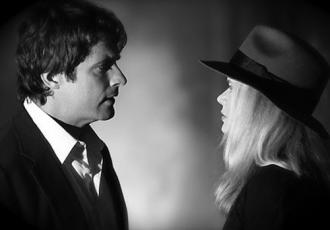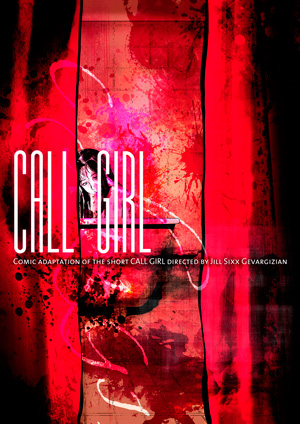映画|イエスタデー・ワズ・ア・ライ|Yesterday Was a Lie
alternative realityテーマの異色ノワールSF映画。キプレイ・ブラウン、チェイス・マスターソン、ジョン・ニュートン。監督ジェイムズ・カーウィン。2008年。
ホイル(キプレイ・ブラウン)というブロンド美女が主人公。その素性は一切明かされないが、彼女は探偵みたいなことをやっている。忠実子分の男(ミック・スクリーバ)を使って探しものをしている。彼女が探しているのはジョン・デュダス(ジョン・ニュートン)という男が残した研究ノートで、デュダスは彼女の元恋人ってことらしい。
映画は全編モノクロ。衣装やセットの雰囲気からして1950年代(ハンフリー・ボガートの映画みたい)に見えるんだが、ケータイやメールが出てくるから現代なのだろう。でもやはり、現代にしてはいろいろと違いすぎるなあという気もする。この映画のテーマはalternative reality、もうひとつの現実、平行して存在する別宇宙を描くということなので、きっとこういうことかとおもう。似てるけど同じではない、どっか別の空間のお話という意図でこういう舞台装置なのかなと。
ホイルはいつもバーボンを飲み、むずかしい顔をしている。屈託を溜め込んで動き回っているようすは、なにかに悩み、過去の自分に囚われているようである。
映画は彼女がセラピーを受けているシーンから始まる。セラピスト相手に夢の話をするんだが、ここで彼女は「エレベーターに乗ろうとするんだけど、こわくて乗れない」とか「女がいる。彼女はわたしを助けようとしてくれている。彼女は別の時代からわたしのためにきた。でもわたしはこわいんだ!」という。
混濁する夢のイメージの合間にダリの絵『Persistence of Memory / 記憶の固執』が出てくる。この場合、エレベーターってのは別の現実に入っていくための装置というような意味かな。
セラピストが「そのひとはだれ?知っているひと?」と質問する。ホイルは答える。
「ええ。彼女はわたし」
その後まもなくホイルは『彼女』に出会う。彼女はバーのシンガーとしてホイルの前に現れる。その後、シュルレアリズムのギャラリーで出くわしたり、占い女になったり、いろんなところで待ち伏せをしていたように登場し、親切顔で人生のアドバイスを寄越すんだが、それらはすべて謎めいた言葉の暗示である。
ホイルは新しいワードを教わるたびに「どこかで聞いたな!」という既視感に囚われ、迷路をさまようような調子であり、これを打開するには「デュダスの研究ノートを手に入れるしかない!」とやっきになって探偵仕事を続行する。
『DS9』のLeeta役チェイス・マスターソンが謎の女シンガーを演じています。ムードたっぷりで歌をうたいます。彼女はこの映画のプロデューサーでもあります。
動画
感想
難解です。TSエリオットやら、ユングやら、むずかしい数式(プランク定数とかいっていた)やらが出てきて、ホラーボーイの知性と教養じゃついていけねーよ!みたいな。
私はこれを3度観ました。2度目からはポイントと思われる会話を書きとり、それを読み、次のシーンに進むというおそろしく効率の悪い鑑賞法で(このエントリの最後にquotesがあります)。文字を書いて読まないと理解した気にならないというのは、昭和の教育を受けた弊害ではないか。水俣病患者のように国を提訴したい!そんなかんじで、やっとこさというかんじで、だいぶわかったような気がします。
ホイルは、とある物理学の専門家チームが行っていた、時空に関する極秘研究プロジェクトの存在を知ります。んで、彼女の元恋人のデュダスって男は哲学者か考古学者か物理学者かよくわからないが、彼はその研究を手に入れたらしい。それを使って時空をどうにか操ってホイルと恋人同士に戻りたいとジタバタしているらしい。らしい、というのは確たる証拠がないからです。もしかしたら彼女が狂ってるのかもしれない。というお話は、私はおもしろかったですよ。小説的な現実性が感じられました。
alternative realityテーマのSFらしく(SFといっても地味)、時系列が頻繁にグニャグニャするように進行します。たとえばですね、ホイルが自分のポケットからカギを見つける。そのだいぶあとのシーンでシンガーからカギを受け取る。あれれ。あれもう持ってたはずじゃ。みたいな。あと、ホイルが男の死体を発見してそれは彼女の持っている銃S&Wで撃たれたらしいと聞いて彼女はギョッとするんだが、彼女は撃ってないんだが、なぜかそこで既視感に襲われ、だいぶ後のシーンで彼女がじっさいに男を銃撃するシーンがある。という調子。留守電のdamn it!のシーンとか。
おもしろいのは、映画の台詞の中にいろんな意味深ワードがちりばめられていて、それがあっちのイベントとこっちのイベントをつなげているようにみえるという点です。あるシーンであるワードが出てくる。忘れたころに別のシーンでだれかがそのワードを口にする。ホイルも、私も「あ、これどこかで聞いたな!」と思うんだが、なんだったかよく思い出せない。それをきっかけに、なにかこう、既視感がありありと出てきて、風景が変容していくような、地面がぐらぐらするようなきもちになる。というシーンが連鎖するのです。
いろんな意味深ワードが出てきたけど、いちばんのキモはManhattanだったのではないでしょうか。カクテルのマンハッタンです。ホイルとシンガーが初めて出会うところで、シンガーはふだん酒を飲まないといってたくせに、マンハッタンをおいしそうに飲み、その酒について講釈を垂れる。そしてずずーと進んで、映画のラストでホイルはバーボンじゃなくてカクテルを飲んでいる。あれはたぶんマンハッタンなんだなと。ここで、シンガーの最初のほうの台詞をもういちど聞くとおもしろいですよ。
"fit" というワードがあちこちで出てきます。シンガーはホイルに次のような話をする。
Things don't always fit perfectly, Hoyle. Sometimes it's the rough edges that make life interesting.
物事は完璧にフィットするわけではない。ときにはぎざぎざしているほうが人生おもしろいでしょ。
別のシーンでは、デュダスも言葉は少しちがうけど同じようなことをいっていました。でもホイルはなんでもかんでも "fit" しないと気が済まないたちなのですね。映画の冒頭シーンではセラピストに対して悩みをうちあけるときこんなこといってました↓
Just trying to figure out how I fit into it.
さらに、別シーン。映画の最後の方。デュダスに対し、フッた理由をこのように述べました↓
We didn't fit.
ホイルという女は頑固というか理屈を重視するタイプで、シンガーはそんな彼女にいろんな話をして考えを改めさせようとします。ギャラリーの倉庫の会話では「理屈で物事を考えてはいけない」という話をします↓
Singer: "Urban archaeology." It's what Dudas was dabbling in before, you know. A lot of people think it's like fitting puzzle pieces together, chunks of like, divorced from their context. But I like to think of it as more like..., like shutting off your left brain, seeing beauty in things the way they are, realizing it's all disconnected or connected, in a different way and being okay with that.
私がこの映画を理解したくて3度も観たのはこの台詞を聞いたからですね。これは観客に向けてのメッセージという意味もあるのかもしれません。
また、別のシーン。ダイナーで会話する場面では、シンガーは「砂糖1粒の重さはどれだけ?」という例を出し、ホイルが「粒の数で割り算をすればいい」と答えると「それは平均値が出るだけ。科学とはかように不完全なものである」とアドバイスをします。
Singer: Formulas only give approximations, averages based on models. Science is incomplete. There's something deeper we can't define beyond probability.
また、このシーンでは「水晶玉やタロットカードは " conscious mind" を "shut off" するための装置に過ぎない」と述べます↓
Singer: I'll let you in on a secret, Crystal balls and Tarot cards are just devices, to shut off the conscious mind. Anything where there are patterns within chaos. Lines on a palm, reflections in a gemstone.
"conscious mind" というワードは、このシーンより前に出てきたデュダスのインタビューのコレとカブっているような↓
Dudas: Well, normally the knowledge is overwhelmed by our conscious mind. It blinds us to something far greater. The tip of a secret known only to certain people.
また、水晶玉とかタロットカードというのは、ラスト近くのシンガーの台詞を聞くと、それらはホイルが探している研究ノートを指していると思われます。
こんな風に「あれとこれが連関しているな」という会話があちこちに出てくるのです。それがえもいわれぬ不思議さをかもしているというか。パズルみたいな映画です。
DVDのExtraの中でキプレイ・ブラウンがこういってました↓
Everytime you watch it, you're gonna get something else. You're gonna see that link, that link, that link. You know, it's never-ending.
この映画を何度も観るとそのたびにちがったなにかが見えてくるよ。あれがこれにリンクしてて、これがあれにリンクしているというような。それは限りなく続くよ。
ほんとにそんなかんじ。
ホイルにおせっかいを焼く謎女シンガーは、映画の冒頭でホイルがネタバレしている通り、ホイル自身です。倉庫のシンガーの台詞を借りれば、ホイルはホイルの "left brain"、シンガーはホイルの "right brain" ということかな。
この映画ではユングを始めとし、むずかしい学者の名前がいろいろ出てきます。私はそのぜんぶをよく知らないんだけど、そういうのに詳しい人がこの映画を観たら、もっと的確な洞察を得られるのかもしれません。そういうのに詳しいひとはぜひ観てくださいよ。
ダリの絵『Persistence of Memory / 記憶の固執』
有名な絵です。時計がぐにゃりとしているヤツ。これはもちろんalternative realityというこの映画のテーマに即していると思われるのですが、それだけじゃないのですね。ギャラリーのシーンでシンガーが「この絵の背景に描かれているのは、ダリの故郷カタロニアの風景なのだ」と解説します。それはダリにとってかけがえのない記憶のひとつだったということですが、ホイルにとってのカタロニアはデュタスとの恋だったのかな。という話を女の友達にしたら「男が考えつきそうな勝手な解釈である」といわれました。あー。おれって凡人だなあと思いました。あー。
DVDのSpecial
DVDのSpecialの内容↓
- Trailer A
- Trailer B
- Photo Gallery
- Making of Videos
Making Of Videosの中にこれだけ入ってます↓
- Featurette
- Noir And The Heroine
- Digital Flmmaking
- Directing
- Hoyle
- Singer
- Dudas
インタビューはぜんぶ英語字幕つきです。Featuretteはyoutubeにあったので、このエントリにも貼りました。上の動画のところにあります。私はぜんぶ観ましたが、監督さんもキャストのみなさんも自信満々でしゃべってるからすげえなあとおもいました(まぁ自分の映画のDVDだから当たり前ですが)。ハリウッドでこういう毛色の変わった映画をつくるひとってのは、これくらい押しが強くないと生きてけないんだなーと思ってたら、意外にもこの監督は「聞き上手である」という評判でした。べらべらしゃべって押しが強いだけじゃないのですね。別の意味で勉強になったような。
Quotes
冒頭のセラピーセッションのシーン。
Hoyle: Somebody else is here. I can't see her. I think... It's a woman. She's telling me something.
Psychiatrist: Do you know this woman?
Hoyle: I think she's come back. Back from some other time to change things, to stop me from ruining... She wants to help me. Help me have a second chance. But I'm afraid.
Psychiatrist: Try to look at the woman.
Hoyle: I don't want to believe her, but I'm afraid she's right, you know? The wrong choices, mistakes.
Psychiatrist: Can you look at the woman?
Hoyle: Yes. Yes.
Psychiatrist: Can you tell me who she is?
Hoyle: She's me.
デュダスがラジオのインタビューでユングについて語るところ。
Dudas: And that's what Jung said, that the unconscious knows things. It knows everything, really. He called it "absolute knowledge," and it surfaces in dreams.
host: And we can tap into it any time?
Dudas: Well, normally the knowledge is overwhelmed by our conscious mind. It blinds us to something far greater. The tip of a secret known only to certain people.
ホイルがTSエリオットの本を見つけたシーン。
man: T.S. Eliot, eh? Never got into Eliot. Can't understand a word of it.
Hoyle: It's just a book.
本の中には以下のフレーズにしるしがついていた。
Through the unknown, unremembered gate
ホイルが初めてシンガーに出会うところ。バーのシーン。
Singer: You know the secret to a good Manhattan? It's balance. A lot of people are shy with the vermouth. Or they forget the bitters. And you gotta have rye. A bourbon Manhattan's just not the same. I don't mean that Canadian whiskey they call "rye." I mean the real stuff. Yep, Balance!
Hoyle: Deep thoughts for a girl who never drinks.
Singer: Only when I'm working.
Hoyle: I'll be damned.
バーの名前はThe Pigeon Hole。
タクシーの中。
Singer: Kind of like Prufrock. "Through certain half-deserted streets." It's T.S. Eliot.
Hoyle: Have I ... ?
デュダスのラジオインタビューの続き。
Dudas: It's the old allusion of God's chess game. Feynman called it that. We can watch the game, but we don't know the rules yet.
radio host: That's how he described the universe.
Dudas: Right, right. And if you watch the game long enough, you can figure out how it's played. That's the secret.
ホイルはPCでなにかの研究資料を見る。
The S.L.I. Phenomenon
Street Lamp Interference
as Evidence of Nonlocality
というタイトルの中身はむずかしい数式がずらずら書かれてあって私には意味不明。ドイルはそれを興味津々で見るんだが、
Fenestra Aeternitatis
と書かれた絵を見てハッとする。これも意味がわからないが、Fenestra Aeternitatisというワードはあとからまた出てくる。そのあとネコといっしょに遊ぶ。
Hoyle: Well, hello there. I'm Schrodinger. Well, hello, schrodinger! How are you tonight? I bounce up-and-down when I talk for no apparent reason!
このあとダリの絵『Persistence of Memory / 記憶の固執』がだれかからメールで送られてくる。送信者は謎。
ホイルの留守電の応答メッセージ。
Hoyle, start singing!
ギャラリー。ダリの絵を見るところ。
Singer: Salvador Dali. "Persistence of Memory." 1931. Wonderful use of browns in his palette.
Hoyle: I'll have to take your word for it.
Singer: See those cliffs in the background? They say that's the coast of Catalonia, Dali's home.
Hoyle: So he included something familiar, even among all that decay. The loss of reality.
Singer: Or maybe that's the memory he couldn't escape.
Hoyle: You an art historian?
Singer: Couple different things. Not enough to quit my day job. Of course, my day job's at night, but hey...
Hoyle: I think we're supposed to be embarrassed by this.
Singer: Yeah. You know, I never understood that.
Hoyle: Me neither. Hoyle.
Singer: Nice to meet you, Miss Hoyle.
Hoyle: You need a drink?
Singer: I'm a girl who never drinks, but knock yourself out.
bartender: How do you take your brandy, Miss?
Hoyle: In a glass.
ドイルがシンガーにデュダスの写真を見せるところ。BGMはG線上のアリア。このシーンのあと、シンガーはドイルをギャラリーの倉庫に案内する。
Singer: So, you into surrealist art, or you just come here for the fashion?
Hoyle: I'm actually looking for someone. Or he's looking for me. I'm not sure yet.
Singer: Dudas.
Hoyle: What do you know about Dudas?
Singer: I know he's in pain. The human psyche's the most beautiful thing in universe. So resilient, yet so fragile.
ギャラリーの倉庫。
Singer: "Urban archaeology." It's what Dudas was dabbling in before, you know. A lot of people think it's like fitting puzzle pieces together, chunks of like, divorced from their context. But I like to think of it as more like..., like shutting off your left brain, seeing beauty in things the way they are, realizing it's all disconnected or connected, in a different way and being okay with that.
Hoyle: Shutting off your brain, right.
Singer: mmm.. a lot of cultures say that you perceive reality more clearly. Aborigines' dream-time, Indian peyote rituals, or just plain alcohol, of course.
Hoyle: The choice of the urban shaman... Give me a puzzle with an answer. Pieces that fit like they were made for each other.
Singer: Things don't always fit perfectly, Hoyle. Sometimes it's the rough edges that make life interesting.
Hoyle: Somebody told me once, "The mind is like a surge protector." It prevents you from experiencing certain things. Is that what you dragged me in here to say?
Singer: You mean non-linear things. Reverse causality, precognition, deja vu.
子分男との会話。
Hoyle: You ever heard of these experiments? A series of images shown to a test subject? Now, most of them are harmless, pleasant, but every once in a while, a traumatic picture appears on the screen. Turns out, the subjet has a negative response a fraction of a second before the picture appears.
man: You mean this is some kind of evidence of, of precognition?
Hoyle: I mean that trauma creates ripples. Some of them slip through. Somebody is messing with me.
man: Whoa, whoa, whoa! Look, Hoyle!
Hoyle: I'm fine. Really I'm fine.
デュダスのラジオインタビューの続き。
Dudas: "We shall not cease from exploration. And the end of all our exploring will be to arrive where we started. And knows the place for the first time."
Radio host: That's Eliot, isn't it?
Dudas: His Forth Quartet, yes. It reminds me of Pauli, the physicist Wolfgang Pauli. We can predict what's next, we know everything that'll happen, really, because our unconscious knows the present, the present archetype.
Radio host: And archetypesalways follow a sequence.
Dudas: Exactly, exactly. It's part of our mythology, our science, our being.
ホイルがラボで卒倒したときに聞こえたデュダスの言葉。これは最後近くにまた出てきます。
Dudas: Time never earned my respect..
ホイルとデュダスがバーでデートするときにシンガーが歌う歌のlyric。
Did I sell my soul for that feeling so long ago?
Did I give my heart for that waste of time?
I'm not asking for much.
Don't hurt me.
Then you wonder, my heart.
Did I sell my soul for that feeling?
You know why yesterday was a lie.
I can't keep thinking I was right.
Don't go.
ホイルとデュダスの会話。
Dudas: Okay. I've got a theory. People say my work is fitting disjointed puzzle pieces together, right? What if the pieces don't fit? What if your mind is like a surge protector? It keeps you from seeing the disordered nature of time, and reality, and... I'm being ridiculous. What you got there? Come on.. Planck's constant?
Hoyle: Excuse me?
Dudas: It's the most fundamental constant in nature. You see, all the stuff in the universe is really just waves. And everything vibrates at a wavelength, related to a mathematical constant. You know, some people belive there are other realities, alternatives, similar to this one, yet the details are changed. We can't see them because they vibrate at different wavelengths. And every choice we make spawns another. It's pretty amazing, huh? A simple decision can create an entire world. Or destroy one. Do you remember this time? This place, this conversation?
Hoyle: I remember.
Dudas: It doesn't have to end this time. Not anymore. You know, maybe, maybe you should..
Hoyle: John, don't start on me about this again.
Dudas: Yeah, yeah, I know. It's one of the reasons. You ever going to let me know what the others are?
Hoyle: Oh, please!
Dudas: You know what bothered me the most? You pretended that we were nothing more than peripheral aquaintances. Something about that struck me as so disingenuous.
Hoyle: This wasn't a good idea. You haven't moved on. You haven't moved on.
Dudas: Moved on? I don't even know what that means, moved on! Look, I'm not dwelling on you. I don't sit at home at night, drowning my self-consciousness in bourbon. But have I put you away? In my past? No, no way.
Hoyle: This was a mistake. I'm sorry. This was a mistake.
セラピストが読んでる本の題名。
October The First Is Too Late
ホイルとセラピストの会話。ホイルがユングの『アニマ』を教わるところ。
Hoyle: I keep coming across a term in something I'm investigating. Fenestra. Fenestra aeternitatis.
Psychiatrist: Window of eternity. Jung believed there's an idealized female archetype deep within a man's psyche. It's called the "anima." Latin for "feminine sould."
Hoyle: Yeah.
Psychiatrist: Some feel that this anima is a sort of bridge between personal self and higher knowledge held in the collective unconscious. When a man falls deeply in love, when he projects his anima onto a woman, she can become his window to eternity. Hey, be careful. You're getting into some pretty obscure stuff here.
Hoyle: Just trying to figure out how I fit into it.
Psychiatrist: I'm a Jungian. I'm not a fortune teller.
ホイルが占い師の家でシンガーと出会う。「あなたはわたしをつけまわしているのか?」「デュダスはどう関係しているのか?」「ノートはどこにある?」と質問したら「おなかすいたわね」とはぐらかされ、ふたりはダイナーにいく。ダイナーでの会話。
Singer: You keep odd hours.
Hoyle: Look who's talking. I work better in the dark. I see better.
Singer: That's interesting. I didn't know it worked that way.
Hoyle: Your crystal balls and your Tarot cards didn't tell you that, huh?
Singer: Check this out. Run-of-the-mills sweetener packet, right? One gram. And there was something like 5,000 grains in here. Take my word for it.
Hoyle: Okay.
Singer: Okay. So, how much did each grain weigh?
Hoyle: Total weight devided by number of grains. 0.2 milligrams.
Singer: Really? How many weighed exactly 0.2 milligrams?
Hoyle: Well, it's their average weight. That's the whole point.
Singer: No, it's not. The point was to figure out the weight of each grain.
Hoyle: Keep talking.
Singer: Formulas only give approximations, averages based on models. Science is incomplete. There's something deeper we can't define beyond probability.
Hoyle: So, you're about to tell me that's what mediums do, tap into the deeper level.
Singer: I'll let you in on a secret, Crystal balls and Tarot cards are just devices, to shut off the conscious mind. Anything where there are patterns within chaos. Lines on a palm, reflections in a gemstone.
Hoyle: Tea leaves.
Singer: There's nothing "magic" about it. Divination isn't about specifics. It's about understanding the patterns of our world, how they repeat, creating a "hole", a "window to eternity", and tapping into the collective. It's all psychology, if you believe in that stuff.
Hoyle: What about... numbers? Symbols. An intricate sequence. Could that do the trick?
Singer: I'd love to find out, wouldn't you?
大学生がホイルの家にきてノートの秘密をしゃべるところ。
lab guy: So, they say this notebook hasn't been seen since the Second World War, right? Some of the greatest minds in 20th century physics worked for these underground societies in Germany back then. I'm talking nontraditional research. Alchemy, occult arts.
Singer: Really?
lab guy: Yeah, we're only beginning to understand the consequences of their work. Most of it was never made public.
Singer: That's fascinating.
Hoyle: So, this backdoor research you're doing, how does it fit in?
lab guy: Let me set the scene first. How do you know where you are in life?
Hoyle: You're asking the wrong gal.
lab guy: Seriously, how do you know? Your memories. Okay, think of time as a row, a sequence that always exists. You orient yourself in the sequence, you know "when" you are by looking at what's behind you. What's supposed to have just happened, your past. You can't see the future, but that doesn't mean it's not there.
Hoyle: Go on.
lab guy: Now, what if you were jumping from place to place in the row. You wouldn't know the difference, would you? Because at any point, you'd only be able to see what's behind you, what's supposed to have just happened.
Hoyle: So you're saying that everything that I experience..
lab guy: I'm saying linear time is a myth, an illusion forced on you by your left brain. You don't live life in order, you just think you do.
Hoyle: Hold on. I've heard this theory.
lab guy: What if I told you it's not a theory? A few decades ago, Feynman and Wheeler cooked up something called "time-reversal symmetry." The idea is that everything in the universe is actually the same stuff existing over and over again in different places, different states.
Singer: Back up a minute. Diffrent places at the same time.
lab guy: It's been known to happen. It's called a "cat state." A side-effect of nonlocal entanglement, what Einstein called "spooky action."
Hoyle: Cut to the chase, kid.
lab guy: Don't you see? Extend the metaphor to people, thoughts.
Singer: The same consciousness...
lab guy: Skipping back-and-forth through time, forever re-experiencing realities from other perspectives, like some cosmic 'clerk' is shuffling different events, different lives, only giving the appearance of distinct selves.
Hoyle: Okay. Even if what say is true, why all the cloak-and-dagger?
lab guy: Certain knowledge... it can be dangerous.
Hoyle: Try me.
lab guy: You know, I wouldn't be telling you guys this if you were... guys.
Hoyle: No kidding.
lab guy: All right. All right. Some cutting edge paraphysicists in Europe are conducting thought experiments into ways that time, reality can be reversed. The idea is that, if you could experience true non-linear time what some call "dream time", then you could interfere with reality, just by making choices in your life.
Hoyle: Would there be any observable phenomena associated with this? Side-effects?
lab guy: Like?
Hoyle: Uh, electrical?
lab guy: I don't know. Maybe.
Hoyle: But you think the answer's in the notebook?
lab guy: That's just it. We don't have the notebook. Nobody knows where it is.
Hoyle: Somebody knows.
ホイルが手にする書類コピーのカバーが出る。
What if the pieces don't fit?
The unanswered puzzles of urban archaeology
by John Dudas
ホイルとシンガーが車の中。
Singer: "Let us go, through certain half-deserted streets, the muttering retreats of restless nights in one-night cheap hotels." He can't love, you know. That's why Prufrock wanders through half-deserted streets. He won't allow himself to love.
Hoyle: Do you think he's right? Do you think that's the system? The way things work?
Singer: Kinda out there, isn't it?
Hoyle: What if someone could perceive linear and non-linear time? If something happened, something happend to the sequence so that you could interact with memories, change them.
Singer: Well, that would mean...
Hoyle: It would mean something's off, something's not working right.
Singer: A jam in the cycle.
Hoyle: A jam in the cycle.
Singer: The totality of human consciousness, accumulated, rarefied, distilled in one person, without even being aware of it.
Hoyle: Tell me one thing. Why?
Singer: You broke something.
Hoyle: Wait! Wait! What if something you did, if something somebody did caused the system to bottleneck, to fragment?
Singer: What makes you think you could fix it?
Hoyle: Well, what would you do? Wouldn't you eventually try...
Singer: Come on, Hoyle. It doesn't mean anything. Forget about it.
Hoyle: Listen to me! If it were true, what would you do?
Singer: Well, I guess... Once you realized, at least, once you suspected what was happening, I'd say you'd try to warn yourself.
Hoyle: Get a message through.
Singer: At first, it would probably be little things, phone calls, e-mails, pictures. But after a while, as you got better at it, as you learned to manipulate the rules of the chess game, you'd leave subtler clues, you'd try to create thoughts, dreams, feelings, people.
Hoyle: I'll never catch on. I'll never get through, will I?
Singer: It doesn't mean you can't keep trying. Maybe you need a little help. Walk me to my room.
ラストシーン。
Hoyle: John, are you okay? Everybody'd worried about you.
John Dudas: It stopped, you know. I go through the motions. Everyday, mechanial existence. But... time stopped.
Hoyle: Look, hurting you wasn't easy for me, but life is hurt. It's trial and error sometimes, that's how we find ourselves.
John Dudas: The errors injure others. The pain goes somewhere. Where do you think that pain goes? It goes from one person to the next. It becomes part of the cycle. And you know what the most terrifying... the most exhilarating part it? Our capacity to not get over the past, our sincere desire not to move on. I'm clinging to that like there's no tomorrow. No tomorrow. Because it's uniquely, remarkably, human.
Hoyle: John. John, I'm sorry. I didn't know it would do this.
John Dudas: Then, don't. Don't this time.
Hoyle: We didn't fit.
John Dudas: We didn't have to. The world's not black-and-white because you see it that way. For some reason, I remember details the most. Details have a way of taking on their own significance, don't they? This... reflections off the water, you standing before 100,000 tiny lights, an extraordinary sense of contentment. Could you put that in the past?
Hoyle: John, what have you done?
John Dudas: You didn't just break my heart, you broke your promises. I'll never understand that.
John Dudas: Stop haunting me! Stop haunting me!
Hoyle: John, you're pulling things into the present, things that are supposed to live in the past. They're memories. You are not respecting time.
John Dudas: Time never earned my respect.
Singer: I think you dropped something.
John Dudas: Wait! Wait!
Singer: Let him. It's all right. Open it. Go ahead, open it.
(Hoyle opens the notebook. Wow! It's empty!)
Singer: You're looking in the wrong place. It's not about a book. It was never about a notebook. You still think there's some formula that could explain all this?
Hoyle: No, no. I am not crazy. How is this happening to me?
Singer: You made a choice. For John, it was the wrong choice.
Hoyle: It was the right one for me!
Singer: Then why do you keep coming back here?! Choices have consequences, Hoyle.
Hoyle: No, no.
Singer: Look, you're dealing with the tip of something that really isn't comprehensible. Your mind chaining dissociated events from different perspectives, different realities, into some kind of coherent story.
Hoyle: You mean experiencing dream time.
Singer: I mean experiencing regret! I don't care if you attribute it to your loneliness, or your need to connect, or your guilt over hurting him. He speaks to you. He sees you all the time in his heart. When he wakes up, and realizes you're no longer there... chaos, disorder come rushing in again. You were an important part of him. That doesn't just evaporate when you decide it does.
Hoyle: What are you saying? He's putting himself into my life? Or the other way around?
ラストシーンのラブソング
Where do you start?
How do you separate the present from the past?
How do you deal with all the things you thought would last?
That didn't last?
With bits of memories scattered here and there.
I look around and don't know where to start
Which books are yours?
Which tapes and dreams belong to you?
And which are mine?
Our lives are tangled like the branches of vine.
That interwine.
So many habits that we'll have to break
And yesterdays we'll have to take apart
Someday there'll be a song
Or something in the air again
To catch me by surprise
And you'll be there again
A moment in...
What might have been
Where do you start?
Do you allow yourself a little time to cry?
Or do you close your eyes and kiss it all good-bye?
I guess you try
And though I don't know where,
and don't know when
I'll find myself in love again
I promise there will always be
A little place no one can see
A tiny part, deep in my heart
That stays in love
With you
画像
画像をもっと見る (11枚)twitterのご案内
当ブログをお読みくださり、ありがとうございます。twitterやってます。ホラー映画好きな方はフォローしてくださいませ。サイトの更新や新作ホラーの情報を随時流しています↓
Facebookのご案内
『SF映画』の最近のエントリ
- +1 [プラスワン] (2013)
- Battlestar Galactica: Blood & Chrome (2012)
- ブランデッド|Branded (2012)
- ポール|Paul - メイキング (2011)
- 宇宙人ポール|Paul (2011)
- ミッション:8ミニッツ|Source Code (2011)
- リミットレス|Limitless (2011)
- VOLCANO 2012|Super Eruption (2011)
- 世界侵略:ロサンゼルス決戦|Battle Los Angeles (2011)
- レッドファクション 地球防衛軍 VS 火星反乱軍|Red Faction: Origins (2011)

| 原題: | Yesterday Was a Lie |
| 制作年: | 2008年 |
| 制作国: | アメリカ |
| 公開日: | 2008年1月17日 (アメリカ) (Park City Film Music Festival) 2009年2月20日 (アメリカ) (Beverly Hills Hi-Def Film Festival) 2009年4月5日 (アメリカ) (Southeast New England Film, Music & Arts Festival) 2009年12月11日 (アメリカ) (Los Angeles, California) 2010年4月6日 (カナダ) (DVD) 2010年4月6日 (アメリカ) (DVD) |
| imdb.com: | imdb.com :: Yesterday Was a Lie |
- James Kerwin :: ジェイムズ・カーウィン [imdb] (writer)
- Kipleigh Brown :: キプレイ・ブラウン [imdb] (Hoyle)
- Chase Masterson :: チェイス・マスターソン [imdb] (Singer)
- John Newton :: ジョン・ニュートン [imdb] (Dudas)
- Mik Scriba :: ミック・スクリーバ [imdb] (Trench Coat Man)
- Nathan Mobley :: ネイサン・モブリー [imdb] (Lab Assistant)
- Warren Davis :: ウォーレン・デイヴィス [imdb] (Psychiatrist)
- Megan Henning :: メーガン・ヘニング [imdb] (Student)
- Jennifer Slimko :: ジェニファー・スリムコ [imdb] (Nurse)
- Robert Siegel :: ロバート・シーゲル [imdb] (Radio Interviewer)
- Peter Mayhew :: ピーター・メイヒュー [imdb] (Dead Man)
- Brian Carpenter :: ブライアン・カーペンター [imdb] (TV Shrink)
- Frank Payne :: フランク・ペイン [imdb] (Coroner)
- John Ronald Dennis :: ジョン・ロナルド・デニス [imdb] (Clerk)
- H.M. Wynant :: H・M・ワイナント [imdb] (Art Patron)
- Johanna McKay :: ジョアンナ・マッケイ [imdb] (Art Patron)
- Catherine O'Connor :: キャサリン・オーコナー [imdb] (Art Patron)
- Bill Dempsey :: ビル・デンプシー [imdb] (Cabbie)
- Joe Leroy Reynolds :: ジョー・ルロイ・レイノルズ [imdb] (Bartender)
- Keri Holland :: ケリー・ホランド [imdb] (Waitress)
- Casey Alan Carver :: ケイシー・アラン・カーヴァー [imdb] (Security Guard)
- Trevor Trout :: トレヴァー・トラウト [imdb] (Server)
- Howard Yeh :: ハワード・イエ [imdb] (Newsie)
- Amara Cash :: アマラ・キャッシュ [imdb] (Other Student)
- Brock Branan :: ブロック・ブラナン [imdb] (Couple in Therapy)
- Claudia Croce :: クラウディア・クロス [imdb] (Couple in Therapy)
- Michael Q. Schmidt :: マイケル・Q・シュミット [imdb] (Art Patron)
- Shadii [imdb] (Medic)
- Amol Shah [imdb] (Medic)
- Ed Cosico [imdb] (Other Trench Coat Man)
- Osbie Shepard [imdb] (Other Trench Coat Man)
- Sarah Nean Bruce :: サラ=ニーン・ブルース [imdb] (co-executive producer)
- Andrew Deutsch :: アンドリュー・ドイチュ [imdb] (co-executive producer)
- S.K. Duncan :: S・K・ダンカン [imdb] (co-producer)
- Steven Hacker :: スティーヴン・ハッカー [imdb] (co-producer)
- Daniel Henning :: ダニエル・ヘニング [imdb] (associate producer)
- James Kerwin :: ジェイムズ・カーウィン [imdb] (executive producer)
- Jill Kerwin :: ジル・カーウィン [imdb] (associate producer)
- Chase Masterson :: チェイス・マスターソン [imdb] (producer)
- Louis Race :: ルイス・レイス [imdb] (associate producer)
- Jay Thames :: ジェイ・テームズ [imdb] (co-producer)
- Robb Thomas :: ロブ・トーマス [imdb] (line producer)
- Peter Allendale :: ピーター・アレンデイル [imdb] (digital compositor: Comen VFX)
- Tim Carras :: ティム・カラス [imdb] (visual effects supervisor)
- Joshua D. Comen :: ジョシュア・D・コメン [imdb] (visual effects producer)
- Lori Freitag-Hild :: ロリ・フライターク=ヒルド [imdb] (digital compositor: Comen VFX)
- Lisa Annitti [imdb] (controller: Comen VFX)
- Saeed Faridzadeh [imdb] (digital compositor: Comen VFX)
- Michael Struck [imdb] (digital compositor: NEO f/x)
- Dwight Elliott Stone :: ドワイト・エリオット・ストーン [imdb] (special effects supervisor)
- Robert Bachelor [imdb] (hair stylist: Ms. Masterson)
- Breanna Khalaf [imdb] (hair designer)
- Breanna Khalaf [imdb] (makeup designer)
- Lynda Nairne [imdb] (assistant makeup artist)
- Judie Tallman [imdb] (hair stylist: Ms. Brown)
- Cheryl Whitney [imdb] (additional hair stylist)
- Cheryl Whitney [imdb] (additional makeup artist)
- Brandon Blake :: ブランドン・ブレイク [imdb] (thanks)
- Kimberley Browning :: キンバリー・ブラウニング [imdb] (thanks)
- Richard Blacker [imdb] (thanks)
- Scott Bosés [imdb] (thanks)
- Russell Bowman [imdb] (thanks)
- Joan Brennan [imdb] (thanks)
- Dave Brown [imdb] (thanks)
- Damian Cabaza [imdb] (thanks)
- Jeremiah Carafano [imdb] (thanks)
- Michelle Carafano [imdb] (thanks)
![ホラーSHOX [呪] :: ホラー映画レビュー](/images/top_logo.jpg)
